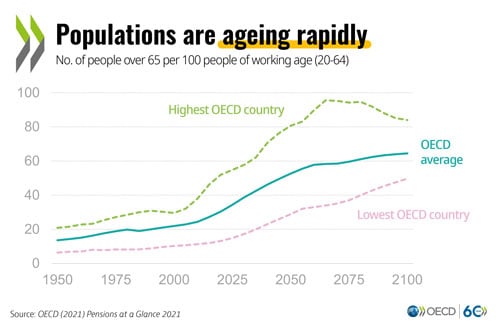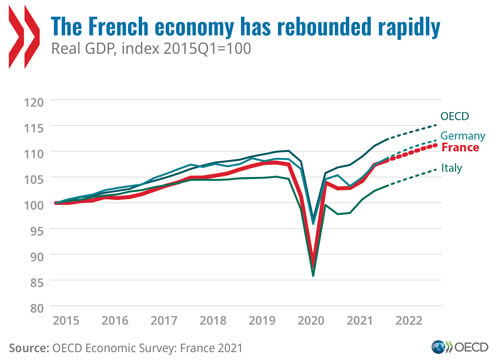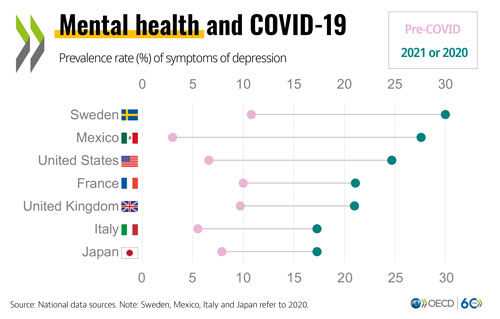OECD Ministerial Council Statement and Outcomes
08/06/2023 – Ministers have issued a joint statement at the conclusion of this week’s Council meeting at Ministerial level. Under the Chairmanship of the United Kingdom, with Costa Rica and New Zealand as Vice-Chairs, Members met for discussions around the theme “Securing a Resilient Future: Shared Values and Global Partnerships.”
Read the 2023 Ministerial Council statement.
The Ministerial Council Meeting (MCM) is the OECD’s highest-level forum, attended by Ministers of Finance, Economy, Foreign Affairs, Trade and other government departments from OECD Member and Partner countries, and by representatives of International Organisations.
This year’s MCM was opened by OECD Secretary-General Mathias Cormann, United Kingdom Secretary of State for Foreign, Commonwealth and Development Affairs James Cleverly, Ukrainian Prime Minister Denys Shmyhal, Costa Rican Minister of Foreign Trade Manuel Tovar, New Zealand Minister of Trade and Export Growth Damien O’Connor, Indonesian Minister of Finance Sri Mulyani Indrawati, and Indian G20 Sherpa Amitabh Kant.
During the two-day meeting, Ministers welcomed the launch of the Ukraine Country Programme and welcomed the adoption of a new OECD Strategic Framework for the Indo-Pacific. Additionally, they welcomed:
- the OECD’s Contribution to Promoting Gender Equality, the proposed Flagship Report on Gender Equality, the OECD Dashboard on Gender Gaps, the new Gender Data Initiative, and looked forward to the development of gender policy reviews and the establishment of a Gender Equality Forum to embed best practice;
- the updated OECD Guidelines for Multinational Enterprises on Responsible Business Conduct;
- progress made on the OECD-Africa Partnership;
- progress made with the inaugural meeting and growing membership of the Inclusive Forum on Carbon Mitigation Approaches (IFCMA) and encouraged broad membership, including large emitters;
- an Accession Progress Update for Brazil, Bulgaria, Croatia, Peru and Romania,
- the approval of the OECD’s Contribution to Promoting Open Markets and a Rules-Based International Trading System in Good Working Order; and
- the creation of the Global Forum on Technology and the OECD Global Forum on Building Trust and Reinforcing Democracy.
Ministers also welcomed the Annual Update on OECD Standard-Setting and adopted the following new or updated OECD legal instruments:
- Recommendation on Environmental Compliance Assurance
- Recommendation on Fighting Bid Rigging in Public Procurement
- Recommendation on Improving the Gender Balance in the Nuclear Sector
- Recommendation on Intellectual Property Rights and Competition
- Revised Recommendation on Principles of Corporate Governance
- Recommendation on Regional Development Policy
- Recommendation on SME Financing
- Recommendation on the Governance of Digital Identity
- Revised Recommendation on the International Standards for Automatic Exchange of Information in Tax Matters
- Decision-Recommendation concerning Chemical Accident Prevention, Preparedness and Response
- Revised Decision on the Guidelines for Multinational Enterprises on Responsible Business Conduct
More detailed information and supporting documents on meeting outcomes and key issues will be available on the Ministerial Council Meeting website at http://www.oecd.org/mcm/.
Additional background is also available across the OECD platform:
Working with over 100 countries, the OECD is a global policy forum that promotes policies to preserve individual liberty and improve the economic and social well-being of people around the world.
 Although life expectancy gains in old age have slowed since 2010, the pace of ageing is projected to be fast over the next two decades. The size of the working-age population is projected to fall by more than one‑quarter by 2060 in most Southern, Central and Eastern European countries as well as in Japan and Korea.
Although life expectancy gains in old age have slowed since 2010, the pace of ageing is projected to be fast over the next two decades. The size of the working-age population is projected to fall by more than one‑quarter by 2060 in most Southern, Central and Eastern European countries as well as in Japan and Korea. After an 8.0% contraction in economic activity in 2020, the Survey projects a strong GDP rebound of 6.8% in 2021 and 4.2% in 2022 as domestic demand resumes. This follows a period of slower growth in France in the decade leading up to the COVID-19 crisis marked by weak gains in productivity and living standards. Low-skilled and young workers face difficulties in accessing the labour market and unequal opportunities have weakened inter-generational social mobility. The pandemic has also exposed a lag among small and medium-sized enterprises in adopting digital technologies.
After an 8.0% contraction in economic activity in 2020, the Survey projects a strong GDP rebound of 6.8% in 2021 and 4.2% in 2022 as domestic demand resumes. This follows a period of slower growth in France in the decade leading up to the COVID-19 crisis marked by weak gains in productivity and living standards. Low-skilled and young workers face difficulties in accessing the labour market and unequal opportunities have weakened inter-generational social mobility. The pandemic has also exposed a lag among small and medium-sized enterprises in adopting digital technologies.